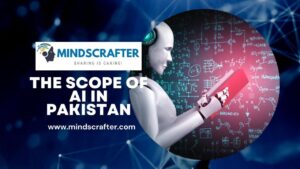
The Scope of AI in Pakistan
Introduction to AI and its potential in Pakistan:
Artificial intelligence (AI) is a rapidly growing field that has the potential to transform various industries in Pakistan. AI refers to the development of computer systems that can perform tasks that typically require human intelligence, such as visual perception, speech recognition, decision-making, and language translation. The potential applications of AI in Pakistan are vast, ranging from improving healthcare outcomes to enhancing financial services to optimizing agricultural production. It is also being used in education and security purposes. However, the country also faces challenges in terms of infrastructure, lack of new skills in traditional education, financial crisis, and regulation that may impact the adoption and development of AI.
Opportunities for AI in Pakistan’s economy, including agriculture, healthcare, and finance:
The potential of AI in Pakistan’s economy holds immense possibilities. In agriculture, AI offers optimization of crop yields, weather pattern predictions, and soil health monitoring. Healthcare can benefit from AI through improved diagnosis, treatment advancements, and personalized medicine development. The finance sector can utilize AI for fraud detection, automated customer service, and enhanced risk management. Nevertheless, the successful integration of AI in these sectors necessitates substantial investments in infrastructure, new educational skills, and regulatory frameworks.
Challenges to implementing AI in Pakistan, including lack of infrastructure and skilled workforce:
While the potential for AI in Pakistan is immense, there are also significant challenges to its implementation. One major challenge is the lack of infrastructure, particularly in rural areas where access to electricity and internet connectivity is limited. Another challenge is the shortage of skilled workers with expertise in AI and related fields. Additionally, there is a need for clear regulations and policies to govern the use of AI, particularly in areas such as privacy and data protection. Addressing these challenges will be crucial to realizing the full potential of AI in Pakistan.
The role of education in preparing Pakistan for the AI revolution:
Education will play a critical role in preparing Pakistan for the AI revolution. There is a need to develop a skilled workforce with expertise in AI and related fields, including data science, machine learning, and robotics. This will require investment in education and training programs at all levels, from primary schools to universities and vocational training centers. Additionally, there is a need to promote interdisciplinary collaboration between different fields, such as computer science, engineering, and social sciences, to ensure that AI is developed and used in a responsible and ethical manner. By investing in education and training, Pakistan can position itself as a leader in the AI revolution and reap the benefits of this transformative technology. There are some reputable universities offering Artificial Intelligence courses in higher education.
The impact of AI on society, including job displacement and ethical considerations:
While AI has the potential to revolutionize many industries and improve efficiency, it also raises concerns about job displacement and ethical considerations. As AI advances, there is a possibility of job displacement and economic disruption as it replaces human roles. Moreover, ethical concerns arise, including privacy issues and the risk of bias in decision-making algorithms. Policymakers and industry leaders have a critical role in addressing these concerns and ensuring the responsible and ethical development and use of AI for the greater benefit of society.

Pingback: Robotics in Artificial Intelligence